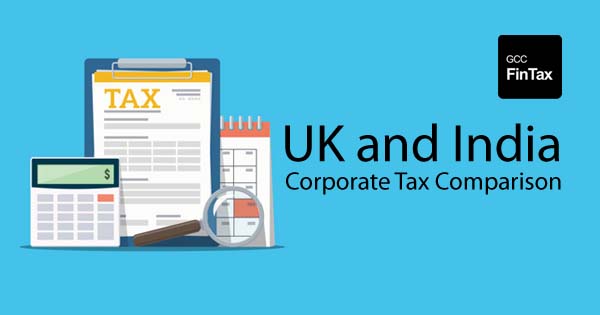
UK is one the most developed nation having various taxes imposed on its citizens. Similarly, India being a developing nation has complicated tax structure and several numbers of compliances have to be fulfilled by the citizens. Today, let’s know more about corporate taxes of both the nations, what are the differences in their rates, to what type of companies it is applicable and various other basis of comparisons.
In UK, all the resident corporates have to pay taxes on the profit they earn whether in the country or outside it. All the corporates have various kind of tax treaties which are followed by them. However, non- resident corporates are liable to pay corporate tax on the profit that is attributed to UK. UK also provide an exemption regarding dividend. On the other hand, India has similar provisions in respect of the applicability. Before Financial Year 2020, corporates in India were paying corporate dividend tax but after the budget the corporate dividend tax was abolished and was made taxable in the hands of shareholders. In a nutshell, Indian corporates also avail the benefit of exemption of dividend. So, applicability of corporate tax in both the nations is more or less same but there is a difference in rates.
UK applies same rate of 19% to all the corporates whether they are resident or non-resident. A lower rate of 10% may also be applicable if the corporate has its patent. The said provision of lower rate is not applicable on royalties.
To the contrary, India has various rates applicable as per turnovers and has differences in tax rates, surcharge rates imposed on domestic companies and foreign companies. Effective rates for the domestic companies are 30% unless its turnover is less than 400 billion in Financial Year 2019-2020 otherwise tax rate of 25% is applicable. On foreign companies, 40% tax rate is applicable irrespective of turnover. Surcharge of 7% or 10% is imposed as per specified conditions. A cess of 4% is applicable to all of the assesses.
On the basis of complexities in tax structure, UK ranks 28 while India ranks at 68. We can say that, tax structure of UK is relatively simpler than India. In mostly all the aspects, be it Alternative minimum tax scheme, calculation of depreciation, dividends, royalties, statutory tax rate, Indian taxation system is more intricate that UK.
Controlled foreign corporations has regulated CFC rules to combat base erosion profit shifting and to control companies not to shift profits in tax havens. Such rules are more complicated in UK than India.
There are several companies in UK which are indulged in such practices and mainly transfers revenue to the subsidiaries located in no-tax jurisdictions. On a positive side, such practices in India are lesser in number.
There are many other bases of comparisons in both nation’s taxation system but from above points covered we can conclude - the developing nation India still needs to focus on improving its complex tax structure or framework and UK needs to improve in some areas of foreign regulations. All the regulations in the countries are needed to be followed without defying intentions of law to have a healthy taxation system.
Disclaimer: Content posted is for informational & knowledge sharing purposes only, and is not intended to be a substitute for professional advice related to tax, finance or accounting. The view/interpretation of the publisher is based on the available Law, guidelines and information. Each reader should take due professional care before you act after reading the contents of that article/post. No warranty whatsoever is made that any of the articles are accurate and is not intended to provide, and should not be relied on for tax or accounting advice.
You can access Law including Guidelines, Cabinet & FTA Decisions, Public Clarifications, Forms, Business Bulletins for all taxes (Vat, Excise, Customs, Corporate Tax, Transfer Pricing) for all GCC Countries in the Law Section of GCC FinTax